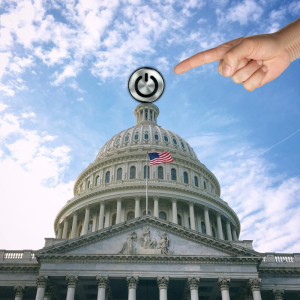For the Greater Good and the Earth Itself
January 21, 2019
The current federal government shutdown is wreaking havoc across its various branches. Between the Coast Guard, NASA, and everything in-between, civil servants are either trudging forwards with their work without compensation or being furloughed, a somewhat silly sounding word to say that they’re temporarily out of a job. Obviously, such a prolonged shutdown would cause controversy on a national scale. Many have been clamoring for the government to resume normal activities, but I ask you, dear reader, is this truly the best course of action?
In a word: no. In several words: the current government shutdown is the most ingenious environmental preservation maneuver in the history of the United States. Now let’s take a moment to review some of the most divisive issues this past year in politics. There have been several headline-grabbing stories throughout 2018, from immigration laws to new social movements. However, the biggest issue was and is most definitely climate change; it affects not only every human on Earth, but every animal, plant, and protist on the face of this planet. And one of the most significant events in climate change for the United States, at least, was the decision of the country to withdraw from the Paris Agreement, an international governing regulations surrounding greenhouse gas emissions in signatory countries. Now, this move shocked a lot of people. There were a lot of angry dissenters who thought this might be an outrageous move in order to loosen climate laws within the States so that coal and oil companies could make a few extra bucks. However, I think what they’re all missing is the big picture.
You see, the withdrawal from the Paris Agreement was only the beginning; the first step in a grand scheme not to increase carbon emissions, but exactly the opposite. Sure, it seems counterintuitive at first. Why would the government pull away from regulations designed to combat environmental degradation in an attempt to reverse it. It’s simple: the US’s long history of American pride. The United States have never played by anyone else’s rules. The colonists didn’t like being under British rule, so they made their own country. It was the Americans who proposed founding the League of Nations after World War I and then didn’t even join it themselves. Even President Eisenhower said trains are stupid and built a ton of highways instead. And now, the United States is withdrawing from the Paris Agreement because we don’t play by anyone else’s rules; we’re going to save the Earth our own way.
Since then, the President has been planning, fine-tuning this master plan to stop climate change—global warming, rising sea levels, all of it—in one swift motion. And we’re now finally seeing the results of this hard mental labor in the shutdown of the government itself. How does this help anything? Because, you see, the government is not a very efficient mechanism. In fact, between the bloated bureaucracy and inflammatory infighting between those who run the nation, the US Federal Government is much like an incandescent light bulb. It is old, dusted, and burns a lot of resources producing heat when people really just want some light in the dark. By turning off this light, the United States is saving a lot of costs in energy. The electricity demand of powering lighting systems, heating offices, and monitoring security that would normally be produced through coal-fueled power plants of gas-hungry generators is now no more. There are fewer cars spewing harmful carbon emissions on the road now that a good portion of DC no longer needs to commute to and from work throughout the day. Meanwhile, the “essential” components of the system still at work shuffle along like a lean, mean governing machine. In fact, this is a move so well-crafted and approachable that the reasoning can be condensed to such a level that even children can understand: turn off the lights when you’re not using them.
As more and more of this country becomes streamlined in its energy needs, it will slowly reach a point where it is able to sustain its power demands through existing renewable technologies alone. This great nation of United States will become “greener” than it was before the industrial revolution of over two hundred years past. Truly, we’re on the cusp of a magnificent efficiency revolution, and there will likely be turbulent times ahead as the country leads the charge into an environmentally conscious future. So should we turn the government back on? No, I think we should leave it off and trust in our country’s leaders as we’re LED into the brighter, eco-friendly destiny that awaits.

